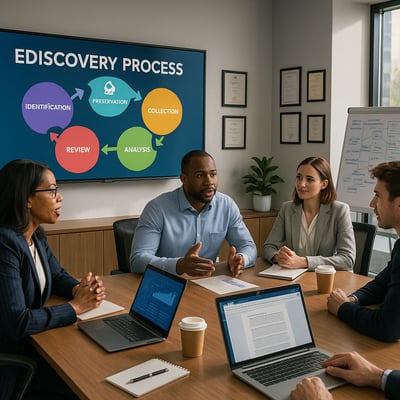" Cut Through the Digital Clutter: Why eDiscovery Is No Longer Optional \n In today’s legal...

Every week, the Array team reviews the latest news and analysis about the evolving field of eDiscovery to bring you the topics and trends you need to know. This week’s post covers the period of August 5-11. Here’s what’s happening.
One of the biggest news stories from last week — a federal judge declaring Google a monopoly — has an eDiscovery element, too.
The plaintiffs asked U.S. District Court Judge Amit Mehta to sanction Google, accusing it of “systemic destruction of documents” and “flagrant misuse of the attorney-client privilege.”
Mehta ultimately decided not to impose sanctions, saying they weren’t needed. Even so, the judge said he was “taken aback” by Google’s actions: “The court’s decision not to sanction Google should not be understood as condoning Google’s failure to preserve chat evidence. Any company that puts the onus on its employees to identify and preserve relevant evidence does so at its own peril. Google avoided sanctions in this case. It may not be so lucky in the next one.”
If an email is privileged, does that privilege automatically extend to any documents attached to that message, even if those attachments wouldn’t qualify for privilege on their own?
It’s a question that was raised in a case we mentioned recently, Linet Americas, Inc. v. Hill-Rom Holdings, Inc. Michael Berman digs into the attachments issue in this blog post.
The court found that, generally speaking, those attachments are privileged, though there’s a wrinkle. As the court put it: “[C]ommunications of facts are privileged even if the original facts are not. Thus, when letters to counsel included certain attachments, the fact that those documents were attached may be privileged, even if the originals are not.”
The attachments deserve privilege because — by disclosing the fact that they were attached to a particular message — opposing counsel might be able to reverse-engineer the content of the privileged message.
However, the actual documents themselves should still be produced on their own if they are not privileged. They just don’t need to be tied to a particular email.
The court said there might be an exception if the original documents didn’t exist in any other form but as an attachment. But that isn’t what happened in Linet Americas, Inc. v. Hill-Rom Holdings, Inc.
Other recent eDiscovery news and headlines:
With a decade of expertise, Julia excels at optimizing enterprise eDiscovery workflows from start to finish. With a deep understanding of how to seamlessly integrate workflows across various eDiscovery platforms, Julia creates tailored solutions for data identification, legal holds, ESI collections, and productions. By harnessing the power of Technology Assisted Review and Analytics, she delivers efficient, cost-effective results that align with best practices and budgetary constraints. Julia’s exceptional communication and customer service skills have fostered strong, lasting relationships with both clients and Project Management teams, enabling her to effectively problem-solve and drive success across numerous projects.

" Cut Through the Digital Clutter: Why eDiscovery Is No Longer Optional \n In today’s legal...



Every week, the Array team reviews the latest news and analysis about the evolving field of...